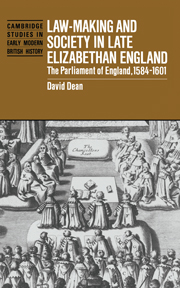Book contents
- Frontmatter
- Contents
- Acknowledgements
- Note to the reader
- List of abbreviations
- Introduction
- 1 Initiation and procedure
- 2 Supply and the general pardon
- 3 The crown and the state
- 4 Religion and the church
- 5 The commonweal
- 6 Law reform
- 7 Private legislation
- 8 Expiring laws continuance acts
- Epilogue: the Parliament of 1604
- Conclusion
- Index of acts
- Index of bills
- General index
2 - Supply and the general pardon
Published online by Cambridge University Press: 14 September 2009
- Frontmatter
- Contents
- Acknowledgements
- Note to the reader
- List of abbreviations
- Introduction
- 1 Initiation and procedure
- 2 Supply and the general pardon
- 3 The crown and the state
- 4 Religion and the church
- 5 The commonweal
- 6 Law reform
- 7 Private legislation
- 8 Expiring laws continuance acts
- Epilogue: the Parliament of 1604
- Conclusion
- Index of acts
- Index of bills
- General index
Summary
Although most bills could come from any of a number of initiatives and had to pass through a gauntlet of procedures, three sorts of bills were exceptional: those granting the lay subsidy, confirming the clerical subsidy and accepting the Queen's general pardon. Prepared under the direction of the Queen's learned counsel, these acts carried special formulae of assent and were usually printed separately. Their general form, composition and wording were established before the parliament began since they were based on previous acts, and they also differed from other bills in that their house of initiation was fixed: the lay subsidy always began since they were based on previous acts, and they also differed from other bills in that their house of initiation was fixed: the lay subsidy always began in the Commons, the others in the Lords.
The lay subsidy acts first dealt with the medieval tax on movables in rural and urban areas known as the fifteenth and tenth, and then, much more extensively, with the more recent direct income tax which was the subsidy proper. The amount of the fifteenth and tenth was not specified because it had long been fixed; two were always granted for each subsidy. However, the number of subsidies offered increased in these parliaments with consequent increases in the number of fifteenths and tenths. The usual single subsidy was voted in 1584–5 and 1586–7, but two were offered in 1589, three in 1593 and 1597–8, and a generous four in 1601. By contrast parliament had little to say about the clerical subsidy, merely confirming the offer made by the Convocation of Canterbury which anticipated that from York.
- Type
- Chapter
- Information
- Law-Making and Society in Late Elizabethan EnglandThe Parliament of England, 1584–1601, pp. 34 - 62Publisher: Cambridge University PressPrint publication year: 1996

